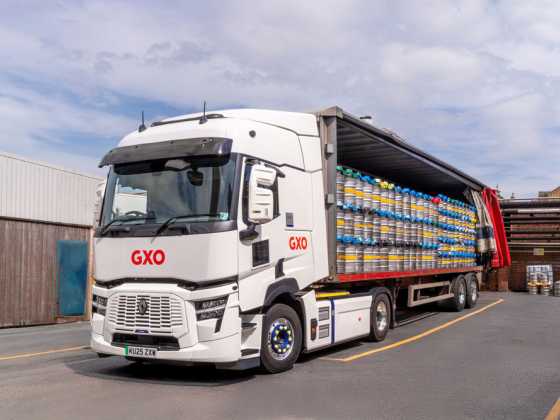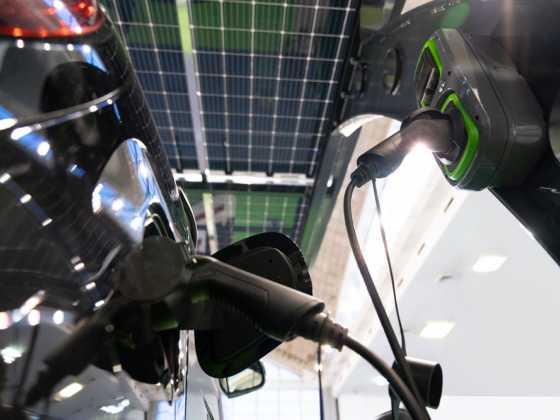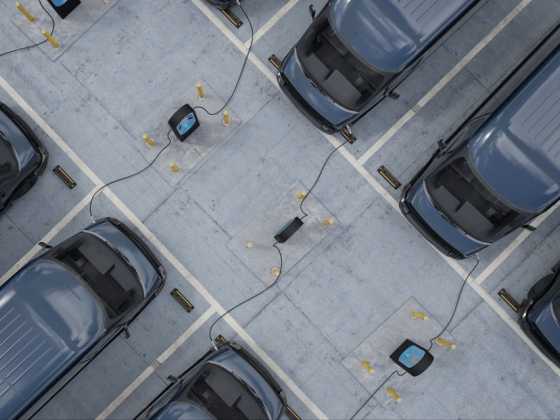Expert Panel: Electric Vehicles

A number of large companies have made public commitments to switch to zero emission vehicles, with many already on that journey. But barriers still need to be overcome to ensure those who want to switch to electric vehicles, can. Our panel of experts – Gill Nowell from EVA England, Lee Brown from the Grosvenor Group, and Dean Hedger from The AA –discuss the challenges on route to zero-emissions
Expert panelist biographies below.
There is a trend for companies with large fleets of vehicles to make public pledges to electrify their fleets, to show industry and government that the demand is there.
The Clean Van Commitment, for example, is a public pledge to move to zero emission vans in cities by 2028. Led by charity Global Action Plan, signatories include ENGIE, Tesco, Network Rail, London Borough of Tower Hamlets.
The Climate Group meanwhile commenced EV100, where companies are invited to make a public commitment to integrate electric vehicles into their fleets or to install charging infrastructure at premises for staff and customer use.
The Climate Group has also launched the UK Electric Fleet Coalition, a group of companies that are eager to make the transition to electric vehicles, but have voiced that they need their ambition matched by the government.
Founding member of the UK Electric Fleets Coalition, Openreach, has one of the UK’s largest fleets with around 27,000 vehicles. The company has recently placed an order of 270 fully electric Vivaro-e vans and nine Corsa-e cars to kickstart its journey to an electric fleet.
These public pledges from businesses show that the appetite for electric vehicles is there. But barriers still need to be overcome to ensure those who want to switch to EVs can.
Lee Brown, head of 0Zone at the Grosvenor Group, said: “The key concerns, when you talk to companies with vehicle fleets, are typically the same. Is the infrastructure ready? Can vehicles with a limited range meet the needs of the corporate market? Are the electric vehicles on the market fit for purpose to enable employees to carry out their jobs?
“The Government has placed huge financial incentives in place to draw both drivers and companies towards electric vehicles. It has also put conditions in place to ‘force the hands’ of the motor manufacturers to produce electric vehicles, and it is continuing to invest in the charging infrastructure.
“You might argue that the Government could always do more, but we can clearly see a shift towards EVs taking place.”
Gill Nowell, director of Electric Vehicle Association (EVA) England, comments: “The benefit in kind tax advantages available
for company car users has been, and is, a huge boost for EV uptake. This is exactly the kind of materially effective incentive that should be sustained by government. Underpinning such incentives needs to be reliable and accessible information on EVs and associated charging options.
“Electric cars should be seen as the ‘go to’ option for fleets and company car users, as well as domestic drivers. Publicly available charging infrastructure needs to continue to grow - payment options need to be streamlined, personal safety for those charging at night in remote locations, accessibility and reliability are key priorities that are and should remain at the forefront of both Government and industry agendas.”
Dean Hedger, EV new business development manager at the AA, believes there is a some way to go before universal adoption of alternative fuelled vehicles (AFVs) can be achieved. He explains: “Batteries, range, payload and charging infrastructure are just a few of the areas which will need to develop significantly to ensure widespread AFV usage. While there are more models coming to market over the next 24 months, the availability of batteries remains a key challenge. We’ve called for UK investment in gigafactories to keep up with demand and improve supply of batteries. It would be good to see bold steps being taken in this area.
“Ensuring our grid infrastructure is fit for purpose is key for guaranteeing access for all to UK-wide charging infrastructure. Similarly, across all AFVs, a far wider choice of suitable vehicles has to be made available.
“From government, the scrapping of VAT on AFV sales and the removal of the ‘premium VED rate’ would go a long way towards increasing adoption. Scrappage schemes and incentivisation to invest in workplace charging could also play a part. Meanwhile. the leasing of infrastructure could reduce business investments in this area.”
Dean also believes that organisations need a greater understanding of how they can develop their fleet. “Undertaking research into areas such as whole life costs and total cost of ownership, while examining how vehicles are used and driven, will help fleet managers see what type of AFVs could easily be introduced into their fleets,” Dean comments.
The contract hire and fleet management sector is vital for encouraging customers into electric vehicles, believes Lee Brown, and the sector could play an even bigger role. He says: “At Grosvenor Leasing, our 0Zone team is dedicated to supporting businesses through the transition to electric vehicles and I firmly believe that this has been instrumental in EV adoption rates across our client base. If we were to sit back and do nothing I don’t believe progress towards a zero emission future would be as quick throughout our customers’ businesses.
“The leasing sector contributes towards a huge proportion of new vehicle registrations in the UK market and, if I was in Government, I would put incentives in place which reward those leasing companies that place orders for EVs so that they, in turn, encourage their customers to move to zero emission fleets.
“Looking at Grosvenor’s latest order bank stats, EVs and hybrids make up over 50 per cent of our car order intake at the moment and I firmly believe that this is down to the advice, support and guidance we have given to our customers over the last three or four years, and the work we have been doing developing low emission policies for them.”
What about hybrids?
The government announced earlier in the year that it would also ban plug-in hybrid cars and vans (PHEVs) alongside ICE vehicles, which took many by surprise.
The concern with PHEVs its that there is nothing to ensure drivers charge them and maximise the use of the electric range - instead using mainly the ICE engine. This would, for obvious reasons, hinder the government’s net zero plans.
However, many in the industry believe that PHEVs are the ‘stepping stone’ needed as the UK transitions to electric.
The BVRLA for examine, has said that the government should only end the sale of new hybrid car and van sales if battery electric vehicle supply, affordability and infrastructure is able to meet the requirements of all fleet segments.
Lee Brown comments: “I agree that it’s a bit soon [to ban PHEVs] but if too many drivers are opting for hybrids but then never using their electric capacity then that defeats the object. My suggestion is that this is driven by the Government’s frustration that many drivers have been opting for hybrids to take advantage of lower fuel and tax bills but it’s not truly meeting the emissions objectives.
“Rather than ending the sale of new hybrid cars and vans, I believe they can achieve the same results by what they are already doing – which is to make the financial advantages of pure EVs so unequivocally attractive that it makes no real sense to opt for a hybrid compared to an EV.
“For a lot of drivers who choose hybrids, it’s a cultural thing. They’re making a half step towards EVs by moving to ultra-low emission vehicles without the range anxiety. Perhaps now more of us are working from home and replacing long travel to meetings with the ability to see customers and prospects instantly by Zoom or Teams, that range anxiety will decline and the uptake of EVs will increase.”
Dean Hedger points out that PHEVs are preferable to old, polluting cars, while EV technology is growing: “Plug-in hybrid vehicles (PHEVs), which are often cited as a stepping stone to full AFV adoption, are not in all cases used optimally and to their full effect. This is due partly to a lack of education, and so in some cases PHEVs are gaining an unfair reputation for inefficiency. Nevertheless, their higher payloads when compared with EVs mean they are still preferable to the older, more polluting vehicles they have been designed to replace, at least while we wait for zero emissions technology to catch up. Where full EV adoption isn’t yet deemed desirable or possible, a PHEV makes an attractive alternative. For example, a PHEV, which can do around 25 miles on battery alone will emit 49g/km CO2, attracting a BiK rate of just 12 to 14 per cent.
“However, with many different models for sale on the market – mild, self-charging and plug-in hybrids – the potential for confusion among business and consumer purchasers is high.”
Gill Nowell meanwhile believes that while plug-in hybrid electric vehicles are a useful stepping stone to fully battery electric vehicles, action to mitigate the climate emergency cannot wait. In a survey conducted by EVA England in response to the government consultation on the phase out date for new sales of petrol and diesel cars and vans, 82 per cent of respondents in England believe the phase out date for ICE sales should be moved to an earlier date than 2035, with 65 per cent of respondents in England supporting a 2030 phase out date. On the question of what should be included in the ban, 97 per cent of participants indicated that new diesel cars should be phased out. 91.5 per cent of participants included new petrol cars in their phase out definition. 67 per cent of participants included new hybrids in their phase out definition, while 48 per cent of respondents suggested new plug-in hybrids should be phased out. 33 per cent suggested new range extended EVs should also be phased out.
Gill comments: “Against the backdrop of these survey results, and speaking on behalf of EVA England here, we understand that many drivers today opt for Plug-in Hybrids, but the urgency of the climate and air quality crises have driven us to take the position that, at the soonest possible date (ideally 2030), only zero-tailpipe emission cars and vans should be sold.”
Vehicle to grid
Electric vehicles have a hidden advantage inside them – the ability to store electricity. This has the potential to help the grid deal with peaks of demand. During peak times of the day, more electricity has to be generated, and traditionally this uses fossil fuels. But the battery from an electric vehicle could store electricity, ideally from renewable sources at non-peak times, then feed this back power to the grid when it needs it. The vehicle / charger communicates with the grid, and of course, makes sure the battery has a full charge for when it’s needed.
Our panelists are in general agreement that this has huge potential for the future, but that the technology is still in its infancy.
Lee Brown comments: “This is a rather exciting concept which has been talked about within the energy sector for a few years now.
“The principle of the system is to essentially utilise the huge amount of power stored in the batteries of electric vehicles to cope with spikes in electrical demand across the national energy grid.
“This will work via a large smart network which communicates with both the national grid and each individual vehicle, whereby a vehicle (or vehicle charger) may be instructed via the network to reverse its operation and give back some of the energy stored in the vehicle to effectively top up the national grid.
“This will be managed in such a way that the vehicle will always be ready and fully charged by the pre-determined departure time which the driver has set.
“In terms of advice to our customers, there is very little they need to consider at this stage, however its worth having an eye on future developments and how they may be benefit companies with a large, all electric, vehicle fleet.”
Gill Howell says: “Smart charging is a simple and widely available solution for optimising EV use in terms of supporting grid integration, as well as keeping the costs of charging your car to a minimum – some smart charging apps allow the user to opt to charge when there are most renewables on the energy system, for example.
“Vehicle to grid is likely to be a viable option for fleet charging and management, however the costs of the kit may currently be on the high side (as opposed to smart charging technologies), given that it is still a relatively nascent technology.”
Dean Hedger adds: “There are questions around whether vehicle-to-grid is truly market ready in terms of the number of compatible vehicles currently for sale on the market. Any vehicle you purchase for this purpose must
be vehicle-to-grid compatible.
“Further awareness is required around the Whole Life Cost (WLC) equation, including the cost of implementation. More information in this area which goes beyond the upfront investment cost will help fleet managers and business owners to make informed decisions about investing in new technology over the total cost of a vehicle’s working life.”
Net zero
In June 2019, the UK became the first major economy in the world to commit to bring all greenhouse gas emissions to net zero by 2050. As transport is a major emitter of CO2 and other air pollutants, fleet and transport operators will be expected to transition to net zero operations. But is this an unfair expectation on the sector?
Lee Brown believes that we need to have a target to aim for – otherwise there will be no focus. He says: “In my mind, if it drives the UK towards a zero emission future, whether it happens precisely by that date or not is not the issue. It’s more important that we change the negative impact we have been having on our planet and only by setting deadlines will that be given any chance of happening.
“If you narrow this deadline down for vehicle fleets, most companies work to a three year replacement cycle. It basically begs the question, therefore, as to whether a company can move its fleet to zero emissions during its next 10 order cycles over a 30 year period.
“With the rate at which fleets are now looking proactively at EVs, and ordering them, and the speed at which technology is moving I see no reason why this cannot be achieved in the car sector.
“To put technological advances in perspective, the first iPhone was only launched 13 years ago. This triggered a global shift of how we live through our Smart phones and Apps. Technology is moving at a blistering pace, and I find it hard to believe that EVs and the technology to support zero emission travel won’t be ready well in advance of 2050.”
A clearer roadmap is needed for fleets to become net zero in their operations, says Dean Hedger: “We have consistently called for a phased plan which provides fleets and businesses with the incentives to switch to zero emissions vehicles. If we want to see widescale adoption of zero emission alternatives, we need to provide fleet managers and businesses with a forward-looking roadmap that delivers clarity and plenty of carrots rather than sticks to help them make the change.
“There is a big risk for the next few years that operators will decide to hang on to older vehicles longer than they should because they’re cost effective, convenient and fit-for-purpose electric options aren’t at scale yet. We may see the age profile of fleets going up because like-for-like alternatives aren’t available in a cleaner fuel derivative.
“To avoid unnecessary business disruption, organisations need genuine choice so they can pick the vehicles and powertrains which are fit for purpose for their individual needs. Integrated transport policies must also provide clarity about what is coming down the track.”
Gill Nowell highlights the dilemma facing government between climate targets and the economy. “There is a need to reduce carbon and related emissions to reduce air pollution and to ensure the UK’s compliance with the commitment to Net-Zero greenhouse gas emissions by 2050. On the other hand, Government also needs to consider the concerns of the motor industry and its employees and current non-EV drivers. However, as underlined by the ‘The Road to Zero’, transport greenhouse gas emissions have fallen by only two per cent since 1990 despite all the Government’s initiatives to date, set against the Government’s commitment to achieving net-zero by 2050.
“A reconciliation of the environmental and economic issues is, therefore, imperative. Against the backdrop of battery technology development that is advancing apace, costs reducing and range increasing rapidly, I have no doubt that fleets will be have the options available to them such that they will be able to operate within net zero emissions by 2050.”
Expert Panel biographies
Gill Nowell, director, EVA England
Gill has worked on EV-grid integration projects since 2012. She works for ElectraLink, the UK’s Energy Market Data Hub, on data-driven solutions for a more flexible, smarter energy system. Gill is a Board member of Electric Vehicle Association (EVA) England, a consumer-focused organisation offering a voice to EV drivers in England, and runs EVclicks – a free, open source library of EV images. Gill is an EV driver and smart charger.
Lee Brown, head of 0Zone, The Grosvenor Group
Lee Brown is head of 0Zone, the Grosvenor Group’s innovative and market leading solution to help companies navigate their way smoothly towards ultra-low emission and electric vehicles. Lee is also managing director of Interactive Fleet Management, the Grosvenor Group’s specialist fleet management business, which means he brings a perfect balance between how fleets can drive down their emissions and the implications of policy setting. Lee joined the Grosvenor Group in 2001, became finance director of Interactive Fleet Management in 2012 and managing director in 2020, and is well-known for his clear and inciteful advice for companies with car and light commercial vehicle fleets.
Dean Hedger, EV new business development manager, The AA
Dean joined the AA in 2018, and, most recently, took on an EV advocacy role. In collaboration with the AA’s senior management team, Dean is delivering new product and services innovation, focusing on EV capability in managed services, customer experience and digital integration.






